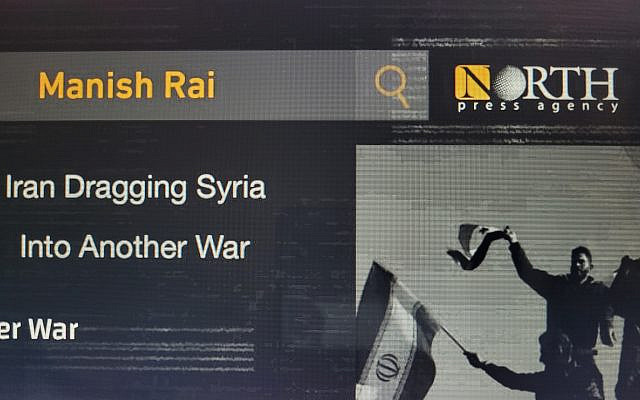
Iran’s Islamic Revolutionary Guard Corps (IRGC) and its all-time favorite Hezbollah have directly fought in Syria in support of the Assad regime since 2012. Iranians militarily and economically have heavily invested in Syria as the view from Tehran is that its alliance with Syria is among the oldest and most sustainable in the region. Preserving Syria’s geostrategic orientation as part of its axis of resistance is an objective universally shared among Iranian leaders. It serves as a centerpiece of its strategy of “forward defense” against the United States and Israel. This approach of Iran has openly come into the public domain now as Syria is rapidly becoming a hot battlefield between Iran and Israel. Recently an Israeli air strike on the outskirts of the Syrian capital Damascus killed a senior adviser in Iran’s Revolutionary Guard Corps (IRGC), according to reports from Iranian state media. Sayyed Razi Mousavi, is one of the top IRGC commanders in Syria. Moreover, Mousavi is one of the oldest IRGC commanders in Syria and Lebanon, he’s been functioning in this area since the 1980s. In a statement read on Iranian state TV, the IRGC said that the “usurper and savage Zionist regime will pay for this crime”. It’s expected that Iranians will retaliate to revenge this major loss and escalation is highly anticipated.
This killing of a senior Iranian operative didn’t occur all of a sudden. Israelis have been picking up and attacking Iranian targets in Syria in response to attacks on Israeli territory by Iranian militias based in Syria for quite some time now. Previously also Israel has carried out several of its strikes inside Syria’s territory in response to rocket and mortar attacks from the country. Israel has also launched air raids on Syria’s two main airports, Damascus and Aleppo, knocking both out of service for a while. Since the start of the Israel-Hamas conflict next door in Gaza, Syria has been experiencing the spillover effect. But now Iran is actively using Syria as a second front against Israel to boost the morale of its proxies in Gaza. Since the beginning of the Syrian conflict one of the most important objectives of Tehran was to create the conditions for an encirclement maneuver of the Israeli state. To achieve this Iranians pre-positioned men and military equipment along the Syrian-Israeli border and especially on the outskirts of the Golan Heights.
Iran’s most trusted and valued proxy group Hezbollah’s bulk forces and allied militias have been deployed along the Lebanese-Syrian border. Where there are large pockets of Shia communities and shrines and near Hezbollah’s stronghold in southern Lebanon. Hezbollah has also deployed fighters deeper into Syria, including around the cities of Damascus and Homs. There have been reports of Hezbollah fighters as far away as Deir al-Zour governorate in the Middle Euphrates River Valley. More recently, Hezbollah forces have deployed to Syrian military positions near the Israeli-Syrian border. This deployment and positioning aimed to engage Israel on multiple fronts. Iranians earlier also tried to target Israel from Syrian territory. The most notable effort in this regard was of the commander of the IRGC’s Quds Force, General Qassem Soleimani he tried to respond to Israel’s active defence campaign, by firing a volley of rockets at Israel from a truck-mounted launcher in Syria. The Israeli Air Force (IAF) decimated over 50 Iranian targets in Syria in retaliation. Israel’s air operations demoralized Iran only for a short period as Iranians started exploring other avenues to attack Israel from Syrian territory. Iran ensured that its future activities in Syria were disguised by blending in deeply with Syrian President Assad’s military and with the Syrian weapons industry.
The expanded presence of Iranians, especially in southern Syria, has already impacted Israel’s threat perception. As a result, Israel’s attacks against Iran-affiliated positions have been on the rise. Israel is playing an aggressive defense, determined to keep the Iranian threat out of its immediate neighborhood in Syria. This can start a fresh escalatory cycle between Iran and Israel in Syria with severe repercussions for the entire region. The Syrian regime should understand that if this ongoing war between Tel Aviv and Tehran in Syria is not contained. Then Israel will not hesitate to launch attacks on its military sites that have been infiltrated by the Iranians.
Iran’s actions are placing the Assad regime’s victory in jeopardy. As the Syrian internal conflict is concluding. The Syrian government should turn its focus toward the mammoth task of reconstruction, and not be dragged into any war with Israel. But Iran seems confident and prepared to take such risks, and it thinks it doesn’t require any approval from Damascus to carry on its destructive activities. Iranians want an unstable and conflict-ridden Syria that they can control and use easily. Now it’s up to the Syrian government to decide whether they want to sit on the sideline as a spectator and let Iran drag their country into another conflict or to intervene and take charge.
No comments:
Post a Comment